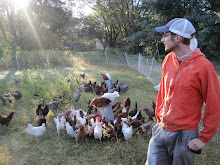Friends-
Farming in the South has taught me that food is political. By design, obviously, it is first biological; the fruit of soil, rain and sun providing our bodies with nourishment for living.
In an economic structure that regards food as a basic need of life ,rather than a commodity, what we put in our bodies is also of principle importance in our society. Yet the great difference between our current market based system and a decentralized, fair-trade food economy is the alarming relationship which food now has to political power and violence.
In a matter of decades the worlds dominant cultures have revolted against once widespread viable networks of stable and diverse food production. In their place they have established a monoculture of eight industrialized crops to provide for 3/4 of the worlds food. This shift, though sudden, was not without dramatic and immediate consequences.
This drastic change resulted in a national food policy that forced family farmers to surrender their land if they could not compete with federally subsidized commercial crops grown for corporate profit. An astounding number of farmer suicides in the 1970's and 80's followed. This same process continues today in India where indigenous farmers are killing themselves at intolerable rates in reaction to global policies which drive down the price which the market will pay for their once valued products and labor.
Food is now another weapon in an undeclared but very real war on biological and cultural diversity that 'civilization' wages, or so it claims claim, to feed the hungry and bring stability to the 'developing' world. In reality, it is clear that international food policy, as dictated by groups like the World Trade Organization, is designed for the monetary benefit of a world-wide class of elites whose livelihood is derived from the exploitation of the land and those who bring forth its fruit.
According to food scientist and author Devinder Sharma, in the year 2008 alone riots broke out in over 37 countries to address the unequal distribution of food. We force other countries to import our over-produced and over-subsidized grains while demanding they accept a culture of serfdom in the place of once lively and beautiful local economies. Thus economically 'poorer' countries of the world are increasingly threatened with famine and social unrest.
The relationship between food and the political state of our world is impossible to overstate. Our current means of production and distribution with its inexhaustible need for petroleum is worsening the divide between ruling and exploited peoples. Under the current design, rich nations will continue to profit from the very process which is impoverishing rural cultures and soils worldwide.
A network of smaller economies committed to bringing health, nutrition and life from the soil for all people is needed now more than ever. If food continues to be exploited as commodity, poverty violence and hunger will grow as the wealthy classes continue to fight over increasingly scarce resources. It is exactly because food is so political that building bio-diverse food communities is now the work of freedom and the human right of cultural and culinary self-determination.



Also remember that in the 70s, Secretary of Ag. for the U.S., Earl Butz stated that "Food is a weapon," which not only legitimizes your claim, it also shows that this was not an unintended consequence but the official policy of our government.
ReplyDeleteThe exciting and refreshing thing is that consumers are being offered options and can help to rebuild these strong local foodsheds where food is a source of nourishment and not a weapon. Keep up the good work farm team!